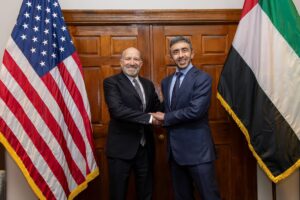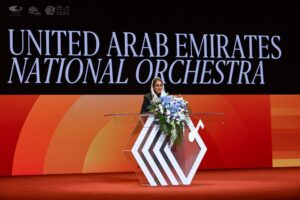UAE Gender Balance Council Participates in OECD Forum on Gender Equality in Paris

Paris, The Gulf Observer: The UAE Gender Balance Council (UAE GBC) participated in the Organisation for Economic Cooperation and Development (OECD) Forum on “Gender Equality: Navigating Global Transitions,” held in Paris on June 10th and 11th. This significant forum convened leaders from governments, the private sector, international organizations, experts, and civil society worldwide.
The forum aimed to devise strategies to promote gender equality amidst global transitions in sustainability, energy, climate, and the rapid pace of digital transformation. Over two days of dynamic discussions, participants focused on the unique challenges and opportunities related to gender. Innovative strategies and policies were explored, emphasizing collaboration and development to ensure gender equality in both the digital era and sustainable initiatives.
Harnessing Government Tools and Data
Mona Ghanem Al Marri, Vice President of the UAE Gender Balance Council, participated in the OECD session on “Leveraging Government Tools and Data for Inclusive Global Transitions.” This session delved into how governments can adapt to green and digital transformations to achieve gender equality and overcome related challenges. The discussion highlighted the obstacles and opportunities these transitions present and offered practical steps governments can take. Key points included using policies, programs, initiatives, and advanced technology to bridge gender gaps and ensure effective budgeting for enhancing green and digital agendas alongside gender balance initiatives.
The session featured an impressive lineup of speakers, including Michelle Bachelet, Former President of Chile; Elsa Pilichowski, Director of Public Governance at OECD; Elisabeth Baume-Schneider, Federal Councillor of Switzerland; Renata Vargas Amaral, Secretary for International Affairs and Development, Ministry of Planning and Budget, Brazil (G20); Young Tae Kim, Secretary-General of the International Transport Forum; María del Pilar Garrido Gonzalo, Director for Development Cooperation at OECD; and Susan Snider, Vice-President of Strategy, Innovation, and Impact at Equality Fund. The discussion was expertly moderated by British TV presenter and journalist Femi Oke.
Mona Al Marri underscored the UAE Gender Balance Council’s commitment, led by H.H. Sheikha Manal bint Mohammed bin Rashid Al Maktoum, to forge impactful global partnerships. She emphasized the UAE’s dedication to advancing gender balance globally, particularly in technology, environment, sustainability, and the green economy. She also highlighted efforts to increase women’s participation in leadership and decision-making roles, aligning with the UAE’s significant contributions to international sustainable development goals.
Advanced Technology and Sustainability
Al Marri pointed out that the UAE has fostered an environment conducive to women’s participation and leadership in green and digital transformations through various policies and initiatives. The UAE’s comprehensive strategy focuses on enhancing Emirati women’s empowerment and gender balance across multiple sectors, including the green and digital economy. This strategy encompasses initiatives to promote women’s roles in decision-making, education and training, and entrepreneurship opportunities.
She also highlighted the “Framework for Gender Balance in the 4th Industrial Revolution” initiative launched by the UAE Gender Balance Council. Developed in collaboration with the World Economic Forum, this pioneering initiative is a global guide to help governments, the private sector, and academia effectively achieve gender balance and create a more equitable future.
Al Marri discussed the UAE’s efforts to bridge gaps in the technology, green transformation, and sustainability sectors. The government has launched the “National Program for Coders,” which aims to build the capabilities of 100 Emirati women in artificial intelligence technologies. Additionally, the “Women in Sustainability, Environment, and Renewable Energy (WiSER)” initiative supports talented women and prepares them to become sustainability and renewable energy leaders. Over 100 women from 30 nationalities have graduated from this initiative, and an annual forum is held to encourage innovative solutions for female sustainability leaders. The UAE boasts one of the highest rates of female enrollment in STEM majors and programs, with women constituting 56 percent of public university graduates in these fields.
Mona Al Marri underscored that women’s representation in leadership positions in these areas is crucial for attracting more women to these fields. She noted that Sarah Al Amiri serves as the UAE Minister of State for Public Education and Advanced Technology, and Dr. Amna bint Abdullah Al Dahak Al Shamsi holds the position of Minister of Climate Change and the Environment. Currently, women comprise about 29 percent of the ministerial portfolios in the UAE government, reflecting a high level of female representation.
Appreciation of Efforts
During her speech, Mona Al Marri emphasized the importance of recognizing institutions that integrate gender balance policies into their strategies. Such recognition is crucial in inspiring other organizations to do the same. She highlighted the UAE’s National Gender Balance Index, which annually honors individuals and entities that support gender balance nationwide. Additionally, she mentioned the “SDG 5 Pledge to Accelerate Women’s Leadership in the UAE Private Sector” initiative, signed by over 64 international and local institutions across various economic sectors. This pledge commits to increasing women’s participation in leadership roles to 30 percent by 2025.
She also discussed how leveraging advanced technology can help governments worldwide identify and address gender balance gaps in the public and private sectors. By proposing tailored solutions for each institution, these efforts can ensure the integration of women in green and digital fields. The commitment to sustainability and renewable energy in the UAE has created an environment that enhances women’s contributions to green initiatives. Women in the UAE have actively participated in renewable energy projects, environmental conservation, and sustainable urban development. Their presence was notably significant at COP28, hosted in Dubai last November.
She stressed that the UAE continually enhances data collection and analysis on gender gaps in various fields, including the green and digital sectors. This data is vital for measuring progress and helping decision-makers implement effective policies to promote gender balance.
Gender Responsive Budgeting
Addressing the critical measures needed to ensure budget effectiveness in advancing green and digital transformations alongside gender balance, Mona Al Marri emphasized that incorporating gender balance into these budgets positively integrates women’s needs and requirements. She highlighted the importance of allocating funds to educate women in STEM fields and train them as leaders in green industries, thereby creating gender-inclusive budgets. At the national level, the UAE Gender Balance Council, in collaboration with the Ministry of Finance, has been working on a gender-responsive budget project.
Cooperation with the Organisation for Economic Cooperation and Development
On the forum’s sidelines, Mona Al Marri met with Ulrik Vestergaard Knudsen, Deputy Secretary-General of the OECD. They discussed strengthening the partnership between the UAE Gender Balance Council and the OECD, building on their cooperative relationship since the Council’s inception in 2015. Key initiatives include the launch of The Gender Balance Guide, featuring globally applicable tools to enhance women’s participation, and their collaboration with the Global Council for Goal 5 of the Sustainable Development Goals to develop a toolkit for advanced global gender balance practices. Both sides reaffirmed their commitment to maintaining close relations and advancing efforts to enhance gender balance regionally and globally.


